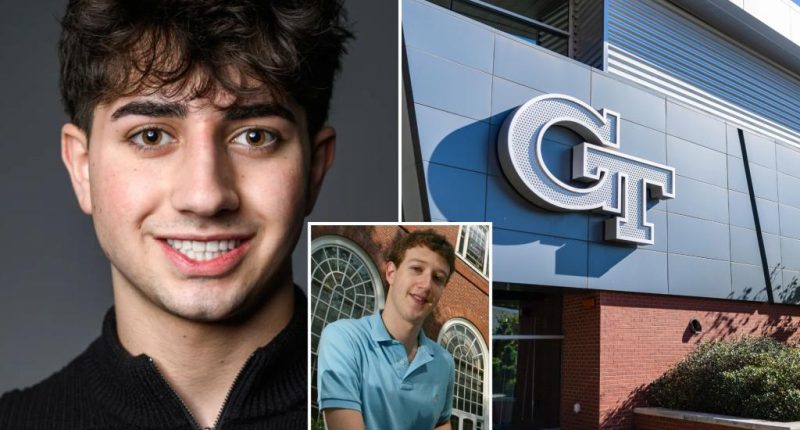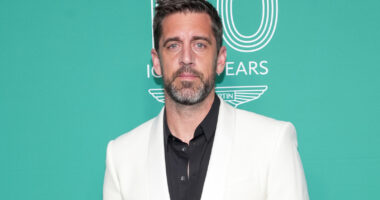
An 18-year-old with a near perfect GPA founded a business which made $30 million in its first year — but that isn’t enough to woo college counselors these days.
At least that’s Zach Yadegari’s experience as he was rejected by fifteen out of the eighteen schools he applied to, despite a 4.0 GPA and score of 34 on the ACT.
The 18-year-old business founder shared his string of college rejections to X, where the post racked up more than 27 million views — with many shocked by elite higher ed’s apparent allergy to the entrepreneurial spirit.
“I didn’t expect to be accepted to all of these colleges, however, I did expect to at least be accepted to a couple of the top schools I was applying to,” Yadegari told The Post. “I think that entrepreneurial accomplishments may not be fully appreciated.”
The Rosslyn, New York, public schooler is already a self-made success before graduation. He learned to code at age 7, was giving lessons at age 10, and had an app in the App Store by age 12.
In his junior year, Yadegari founded Cal AI, an app that calculates how many calories are in a meal just by snapping a picture. It now makes tens of millions a year.
Nonetheless, the teen applied early to the University of Pennsylvania, where he was rejected.
During the regular decision round, he was turned down by Stanford, MIT, Harvard, Yale, Washington University in St Louis, Columbia, Princeton, Duke, USC, the University of Virginia, NYU, Vanderbilt, Brown, and Cornell.
“I held out hope for Stanford, but then when I opened their rejection letter, all of the prior rejections just flooded in and really hit me at once,” the Roslyn High School senior said.
Ultimately, he was only accepted by Georgia Tech, the University of Miami, and the University of Texas.
In addition to posting his rejections and acceptances, Yadegari shared his personal essay, which told the story of how he changed his mind about going to college.
“I began my own journey fiercely independent, determined to forge my own path,” he wrote. “Now, I see that individuality and connection are not opposites, but complements… In this next chapter, I want to learn from humans — both professors and students — not just from computers or textbooks.”
His brutal application results sparked a fierce debate online.
“Honestly though, is college for startup founders[?],” one user asked. “The skills you are seeking are not to be found in college.
“To its core, college should be for people who fundamentally want to further research and science, not job seekers. You’re clearly on your way without it, do they need you?”
“Zach, don’t change a thing about yourself,” another user responded. “Go forth boldly, with the confidence you display here. One day those same universities will come begging to you to grow their endowment. Laugh in their faces and keep doing what you do.”
Elsewhere in his personal essay he wrote: “One million dollars of revenue. In the last 30 days … Was this hedonistic treadmill of capitalism what the rest of my life was designated for? … In the rejection of the collegiate path, I had unwittingly bound myself to another framework of expectations: The archetypal dropout founder.”
Yadegari believes admissions officers didn’t appreciate his business ventures.
“I’m convicted in my belief that the admissions offices are not adequately weighting building a company and opening up jobs compared to other extracurricular activities such as volunteer work,” Yadegari told The Post.
Of course there’s no way to hear the deliberations that went on inside of these ivy-covered admissions offices, but he very well may be right.
Rather than encourage runaway success, colleges can hold back kids with professional escape velocity.
Academia has clearly not been a hospitable place for precocious entrepreneurs. Cases in point include Steve Jobs, Bill Gates, Sam Altman, Mark Zuckerberg, and Larry Ellison who are all dropouts, although it should also be pointed out they left to pursue their businesses which were on the path to becoming household names.
Colleges frequently teach kids what to think, rather than how to think. They often push rote memorization, crush creativity, and funnel students through onerous requirements. It’s a massive, expensive, and time consuming conformity process.
Perhaps Yadegari’s willingness to admit that he once was opposed to going to college was a turnoff to admissions officers — but they should be glad to have won back one of the growing number of young people who are skeptical of the value of college.
More than two thirds of Zoomers believe they don’t need a degree for success.
“There definitely is growing skepticism [about college],” Yadegari said of his peers. “I think [my results] could discourage people who are trying to follow a similar entrepreneurial path from applying to these schools.”
Yadegari says he will probably head to one of the three colleges that admitted him, though he’s not sure he’ll make it through four years.
“I’m just going to go to build relationships, and then at whatever point I think I’m ready to move on to the next stage of my life, I will,” he said.
One college admissions consultant explained that attitude may have been apparent through Yadegari’s personal statement and worked to disadvantage him.
The statement offers “no clear reason why he would benefit from attending college … At its essence, the personal statement must convey who the candidate is beyond his or her accomplishments and how they’ll uniquely contribute to the campus,” Christopher Rim, founder and CEO of college admissions consultancy firm Command Education, told The Post.
But Yadegari’s whole experience is more illuminating as proof that being too precocious — or even being confident enough to admit that you don’t necessarily need college — is a turnoff to elite higher ed.
Colleges want to mold students into their own vision of a model citizen. Someone who arrives on campus already walking the walk — and raking in $30 million in their own right — is a threat to that model.








